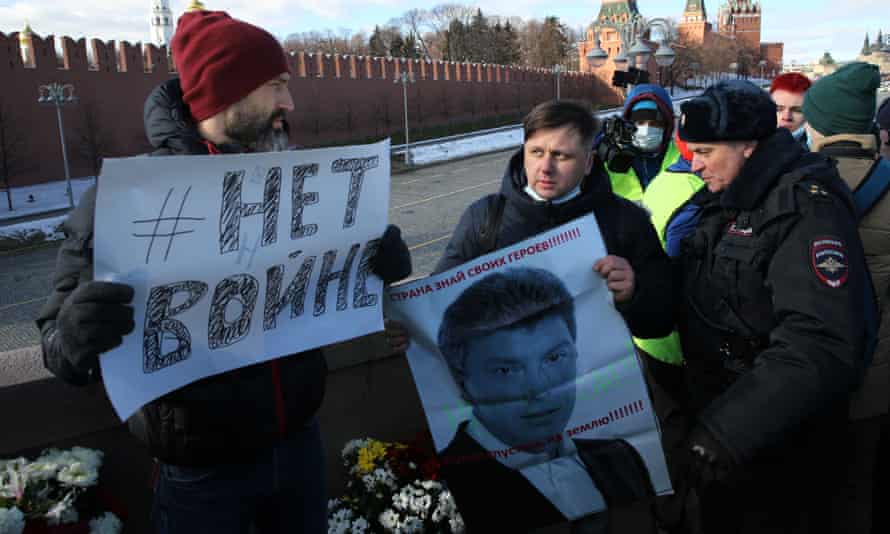The Russian president, Vladimir Putin, has promoted Ramzan Kadyrov to lieutenant-general for his role in the invasion of Ukraine, which the Chechen leader is using to showcase his loyalty to Moscow and his own impunity.
This week Kadyrov claimed that a key ally linked to the 2015 murder of the Russian opposition leader, Boris Nemtsov, was injured fighting in the besieged port city of Mariupol.
Rustam Geremeev was pictured in hospital, where Kadyrov visited him. Earlier videos the Chechen leader posted calling Geremeev a “dear brother” claimed to show him on the frontlines in Mariupol, including at the city hall.
Nemtsov’s family have long insisted that Geremeev was a mastermind of the murder plot. Five Chechen men were found guilty of the killing in 2017, but the trial was denounced by relatives and allies as a cover-up that failed to bring those behind the assassination to justice.
Investigators told the 2017 trial that they visited Geremeev’s property in Chechnya but “no one opened the door”. They also named Geremeev’s driver, Ruslan Mukhudinov, as an organiser of the killing and said he offered the suspects millions of roubles for the murder.

Mukhudinov has since fled and investigators said after the verdict that the case against him was ongoing. Geremeev, who is a relative of two Russian MPs, served in the same paramilitary security unit as Zaur Dadaev, a former senior officer convicted of shooting Nemtsov.
The unit has close ties to Kadyrov, though he has never been directly linked to the murder. Geremeev’s appearance on the frontlines in Mariupol is a show of both Kadyrov’s strength and his allies’ apparent ability to defy Russian law.
However, the multiple videos shared by Kadyrov are not filmed on the frontline, suggesting the Chechens may have a role with as much responsibility for propaganda as for fighting.
The presence of Kadyrov’s men, who have a reputation for extreme brutality, is most likely aimed as much at spreading fear as bolstering numbers in battle.
They may also take on other tasks, with some reportedly assigned to patrol behind frontline forces and shoot deserters. Others have been assigned to interrogations of civilians in the city – a grim speciality of Kadyrov’s followers, who have a track record of torture and abuse.
A senior commander from one of the eastern Russian-backed breakaway regions, Alexander Khodakovsky, said in a video interview that the Chechens had not been expected to fight on the frontlines.
Instead they were originally brought in for “clearing” operations in territory Russia seized around Mariupol. He later apologised to Kadyrov for the remarks undermining his fighter’s military prowess.
For Kadyrov himself, regardless of the role taken on by his troops, the war has offered a chance to showcase his commitment to Putin, the man on whom his own bloodstained authority relies, by sending troops.
To this end he has attempted to mobilise Chechen society behind the war effort, including recruiting at martial arts clubs and recently opening the gates of its prisons to army recruiters, with a group expected to travel to fight in Ukraine with the next rotation, security services said.
But he has also used it to try to boost his own profile as a ruthless fighter, with his men emphasising their loyalty to him rather than to the Russian state. He has a troubled relationship with branches of the Russian security services.
This week he denounced peace talks even as Russia promised to reduce military activity around the capital, Kyiv. “We need to finish what we started,” Kadyrov said in a statement.
